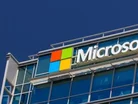Microsoft: Saving $250 Million a year by putting Employees on 4GEE

With the widespread availability of 4G connectivity and the recent UK flexible working legislation, a large proportion of UK business has already witnessed how allowing staff to work flexibly and remotely offers numerous commercial benefits.
READ OUR LATEST MAGAZINE ISSUE: January 2015
Many employers now recognise that flexible working doesn’t purely involve granting ‘working from home’ privileges.
The most progressive of these see a truly mobile workforce as a means to improving productivity and reducing a range of fixed costs, whilst allowing staff to choose their location based on the work that has to be delivered on any given day. Those businesses recognise that flexible working offers a strategic opportunity to increase profits, rather than just functioning as an employee perk.
At Microsoft we’ve been making strides in this direction for some time. Central to our approach to a mobilised workforce has been our use of 4G, in partnership with EE, to banish landlines and remove employee reliance on email.
This has saved employees time and created cost savings for the business, by using the company’s own Lync app over 4G – a solution for online chat, video conferencing, desktop sharing, presence, and enterprise voice.
Having mobilised our UK workforce of around 3,000 users with 4GEE we are now looking to use Lync as part of our wider IT strategy to re-imagine the world of work by rethinking the nature of work in terms of when, where and how people work.
Lync running on 3G just wasn’t fast enough for us to make the most out of it. With the superfast data speeds and greater reliability that 4G affords, we’ve been able to use Lync to its full potential, and as a result, we’re saving at least 30 minutes per employee per day, plus US$250 million annually worldwide on infrastructure and travel, using this single app alone.
Before 4G adoption, employees would use Lync infrequently from their phones. Now, it’s used daily. Some people don’t come to the office at all - they don’t need to. Lync is so feature-rich that employees can set up a meeting within minutes and enable people to attend wherever they’re located across the globe. B
Mobility tactics like the use of Lync are part of our ‘Business Reimagined’ vision and desire to create a ‘is about rethinking when, where and how our people work, and our people are judged on output, not whether they’re still at their desks into the late evening.
Like most effective flexible working methodologies, the vision is founded on enabling people to work wherever they want, as effectively as if they were in the office. This concept also extends to engaging customers through mobile devices and connecting systems together so information flows more freely around the organisation.
All businesses, regardless of their size or industry sector, must act quickly to seize the vast opportunities offered by the mobile revolution - increasing efficiency and unshackling staff from unproductive legacy working practices. There are still too many firms that need to move away from the archaic ‘bums-on-seats’ mind set and start to measure output by what employees achieve, rather than hours worked or the period for which they are physically present.
It’s a revolution that has the power to free information, empower staff, improve customer engagement, boost productivity and make businesses more agile; but embracing the concept of mobility is a crucial first step to achieving it.
The ultimate goal is what EE refers to as ‘Total Enterprise Mobility: where all the information you need can flow freely between the people and machines that need it, regardless of where they are.
As digital transformation and the ‘tech evolved workplace’ become essential components of overarching business strategy, mobilising – and reimagining – your workforce is critical in staying competitive in an age of highly flexible and agile competition.
By Andy Gitsham, head of IT for Microsoft in the UK
Follow us on Twitter @BizReviewEurope and check out our Facebook page.
Featured Articles
SAP has announced it has appointed a new President for a newly-created EMEA region, aiming to make the most of the opportunities of cloud and AI technology
Technology giant SAP has expanded its portfolio with the acquisition of LeanIX, a leader in enterprise architecture management (EAM) software
To help businesses achieve increased productivity, Siemens and Microsoft are deepening their partnership by showcasing the benefits of generative AI

